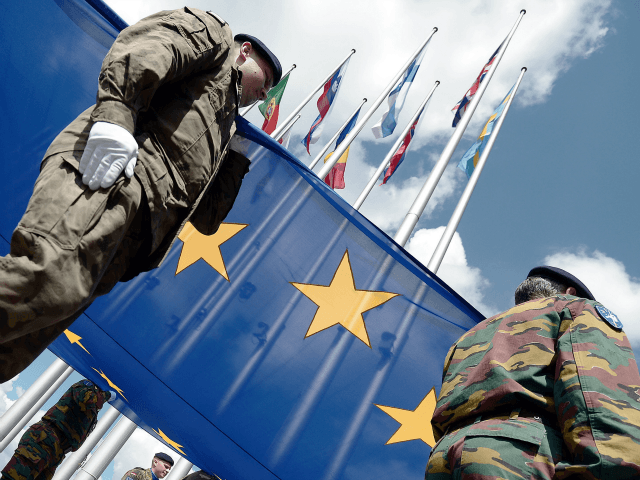A European Army is now one step closer to becoming a reality, just over 18 months since Britain’s former Deputy Prime Minister Nick Clegg branded warnings that the EU was aiming for such expansionism a “dangerous fantasy”.
Mr. Clegg, among others, have gone quiet with his usual derisory treatment of the EU army warnings in the last few months, as top EU policymakers have elaborated upon their ideas for a pan-European Border and Coast Guard.
Now it looks like the plans are not just formalising, but going further than anyone thought possible, with documents outlining what an EU army would look like, including the ability to take control of national borders without the consent of the government of the nation in question.
In theory, this would mean that EU army members could seize border controls, or lackthereof, from countries like the United Kingdom without the permission of the country’s leaders or elected representatives.
According to the Times, the proposals for a 2,500-strong border and coast guard force could see armed personnel first deployed to areas like Greece or the Balkans.
The paper likens the idea of primarily German soldiers seizing power across Europe to the Second World War. Bruno Waterfield and Francis Elliott report: “The force, wearing blue armbands and an EU and agency insignia, would be equipped with naval patrol vessels, helicopters and drones, according to plans tabled yesterday by Jean-Claude Juncker, the European Commission president”.
Almost 18 months ago, UKIP’s leader, Nigel Farage, warned of the plans for an EU army in a big, pre-European Parliamentary Elections debate with then Deputy Prime Minister Nick Clegg.
Mr. Clegg lost both televised debates in 2014, notably calling Mr. Farage’s warning a “dangerous fantasy”. He said: “The idea there’s going to be a European air force, a European army, it is simply not true. This is a dangerous fantasy… it is not going to happen”.
The Times also reports that a major European summit, due to be dominated by UK Prime Minister David Cameron’s “renegotiation” demands to halt a British exit from the EU, will instead now focus on the plans for the EU army.
The plans include the statement: “In urgent situations, the agency must be able to step in to ensure action is taken on the ground even where . . . that member state considers there is no need for additional intervention”.
The European Union’s chiefs have clearly seen the migration crisis as an opportunity for further expansion, as hawkish EU tax payers as well as those on the populist right demand a greater crackdown on immigration. The plans published are set to portray further EU expansion as a way to control, rather than open Europe’s borders further.
“What we are creating today is more Europe,” Dimitris Avramopoulos, the EU’s migration commissioner, said of the move.
The news has been described as a “full frontal power grab” by UKIP’s spokesman Diane James MEP while Poland’s foreign minister has said: “For it to be a structure independent from nation states is astounding . . . an undemocratic structure reporting to no one knows who”.
Funding for the force would reach €322 million by 2020, and Mr Cameron is said to have pledged his support for the new force already.
The new European Border and Coast Guard is set to have a 1,500-strong force that can be deployed in under 3 days, with the organisation now able to buy equipment itself for the first time, rather than relying on donations from Member States.
And the group expects to be able to operate in “third countries” – that is countries outside the European Union that the EU army feels it is necessary to intervene in.
WATCH:

COMMENTS
Please let us know if you're having issues with commenting.